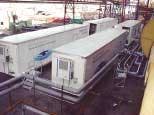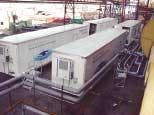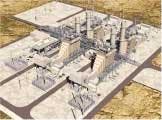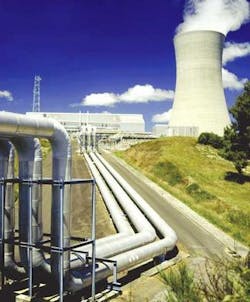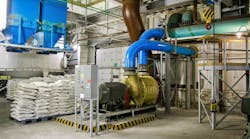By Ron Salvador
To produce power, every plant needs a consistent, running supply of clean water. When something impedes the water treatment process, or additional capacity is needed (i.e., the advent of peak season), plant managers often call a mobile water services provider for a temporary solution on an emergency basis or at pre-planned intervals.
These systems can be pre-packaged turnkey or custom solutions loaded on tractor trailer rigs – or nuts-and-bolts operations that can be easily installed and removed. They can be employed to compensate for sudden system failure, routine maintenance or upgrades – and, again, to take up the slack during peak seasonal demand. Regardless, they provide end-users with that added sense of relief that they can get the quality of water they need without a major dent in their capital improvement budget.
However, using mobile water treatment systems only as a temporary emergency measure limits an operational cost savings dimension that such equipment can provide for any plant. When incorporated into a broader water treatment strategy, it can be a cost-efficient solution for short- and long-term applications, and is now available in a multiple configurations to meet a range of needs.
'Tis the Season
In general, building a new water treatment system to meet seasonal demand does not make financial or operational sense. This same logic can and many times should be applied to long-term or permanent water needs. With mobile water systems, a plant is able to increase water system capacity incrementally while avoiding a significant capital investment.
For instance, mobile installations' seasonal flexibility is picking up traction in the power industry. This past summer, a large eastern power company, serving mainly an urban area, needed help with its power generating facility that delivers 500+ MW to its mixed customer base. The plant employed mobile water treatment systems as a strategic measure to meet the increased water needs for its peak demand plant.
Instead of buying a new water treatment system, the customer leased a single mobile reverse osmosis (RO) unit to run in double-pass mode to supply the peaking unit. This mobile system was capable of providing an additional 300 gallons per minute, allowing the plant to run at full capacity by adding incremental generating capacity. Following the summer season's peak demand, the unit switched back to the plant's main demineralizer for its water supply, reducing the burden on its demineralizers for the remainder of the year.
Power Focus
Power plants are in business to produce power. Water treatment specialists are in business to provide water system solutions. During influent water quality changes, power plants are not always equipped to develop the most effective solution. Top tier mobile water services providers will supply the technology and on-site expertise to handle these fluctuations and provide a more cost-effective solution.
For example, another mobile systems customer was experiencing an unexpected rise in feed water turbidity, resulting in the fouling of its water treatment equipment. GE, the service provider in this case, recommended a mobile multi-media filtration (MMF) system for the customer. The customer avoided the unplanned expense of new equipment and was able to test run the long-term effectiveness of the new MMF solution. In cases like this, mobile water equipment allows plants to redirect financial investments into customer-centric initiatives versus water treatment, a necessary but non-core process.
Mobile water service's flexibility also extends into situations requiring water of a different or new specification. Pre-filtration and polishing systems can be added to the existing water plant. For instance, a mobile electrodeionization (EDI) system can be integrated behind an RO and generate water for a range of ultra high-pressure boiler feed water applications. Rather than relying on one technology, such as a mixed-bed system, this offers power operators an opportunity to experiment with new water purification technologies in order to optimize a particular application.
It Must Be All About You
To employ mobile applications as a cost-effective solution, a provider must match individual needs, process knowledge and technology capabilities. One size does not fit all, and systems designed to produce more water than a power plant needs will not make economic sense, require additional storage, and can jeopardize the reliability of the water supply with the constant starting and stopping of the mobile equipment. Systems that consistently produce the right quantity of water are often the most cost effective on a per 1,000 gallon basis.
Mobile water treatment extends beyond emergency use. For power plants considering an upgrade to existing equipment, or in need of a new MMF, RO or EDI, it provides the opportunity to test a variety of technologies and system combinations. Many times testing a particular technology's effectiveness and revisiting a water treatment system in various test modes provides a new perspective and finer-tuned strategy for new water treatment system development
It also provides an alternative where space constraints, permit limitations or capital restrictions stand in the way of permanent water system construction, and thus, power plant growth. Erecting a new building means permits, access to physical space and lengthy construction timelines. In new construction cases, an average of half of the budget for the new treatment system is allocated to construction costs. With a mobile water solution, the majority of the budget is used for the actual water treatment solution.
Conclusion
Operating any plant is expensive. The future business environment will continue to illustrate this daily, particularly in the power industry as most experts project that the energy market will continue to see significant change. The power and water industries will need to work together to come up with the solutions demanded by the new energy market. Mobile water treatment systems may not solve the impending energy crisis, but it does its part to make things better than before by offering plant operators cost containment, operational optimization and future flexibility.
About the Author: Ron Salvador is platform leader of GE Infrastructure-Water & Process Technologies' Mobile Water Systems based in Trevose, PA. Salvador manages the overall responsibility for Mobile Water fleet development, planning and contract execution. GE's systems available in a range from 100 to 600 gpm can be combined with a MMF unit and a single- or double-pass RO system, along with mixed-bed polishing. For more information, visit www.gewater.com.
